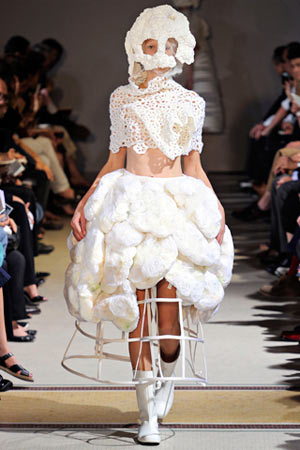Back in the spring of 2008, I created the DILFIT Awards for Self-Loathing in Fashion. My list of winners ran in The New York Times’ T Magazine. (“DILFIT,” as you have no doubt guessed, is the acronym for “Do I Look Fat In This?”)
I had hoped to bestow the DILFITS annually, but, lazy worm that I am, I haven’t. I am happy to announce, however, that there is a winner for the 2012 Spring and Summer season.
It is Rei Kawakubo, whose inspired creation—pictured here—so perfectly reflects the “complexity and feminist ambivalence” that Vogue’s Sarah Mower admired in the Japanese designer’s Comme des Garcons collection for Spring.On days when a woman applies too much eye makeup, and it smears all over her face when she tries to remove it, and rubbing only makes her skin look raw, and she’s knee-deep in used cotton balls and late for work, or a date, and it’s that time of the month, this is surely what she will want to wear to flagrantly and stylishly express her dismay at being herself.
The white boots, which reminded Style.com’s Tim Blanks of technician-wear appropriate for a post-tsunami nuclear reactor melt-down, or “equally….sixties couture a-go-go,” will show off every bit of mud a determinedly self-loathing woman drags herself through.
And, yes, you will look fat in it.
___________________________________________________
If you have a nominee you would like me to consider, I’d love to issue further awards. Please use the contact form and include a link to the image as well as your reasons why the outfit reflects, soothes, illuminates or compliments self-loathing.
___________________________________________________


